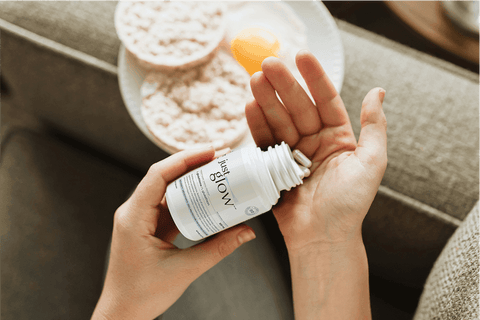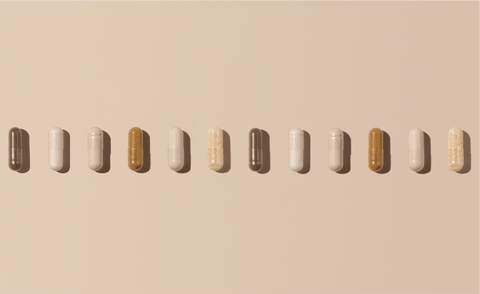How to Increase Glutathione in Body Naturally

Key Takeaways:
- Glutathione is a crucial antioxidant that neutralizes free radicals and supports immune function.
- Poor diet, stress, and environmental toxins can deplete our body's glutathione levels, leading to potential health issues.
- Incorporating glutathione-rich foods, supplements, and lifestyle changes can boost glutathione levels naturally.
- Addressing glutathione deficiency through natural means can enhance overall health and well-being.
-
Explore dietary sources, supplements, and lifestyle habits that support your body's ability to produce glutathione.
Understanding Glutathione: A Powerful Antioxidant
Glutathione is a key antioxidant essential for our health. It's made of glutamine, cysteine, and glycine, three amino acids. Our body makes glutathione on its own. We find it in the liver, lungs, and more body areas in large amounts.
What is Glutathione?
Glutathione is a tiny but mighty antioxidant. It fights off free radicals and stops them from harming our cells. Our bodies make it using a mix of enzymes and other building blocks. Sometimes, your body might need a little extra help to make enough. This is where glutathione supplements and certain foods come in handy.
Glutathione's Role in Maintaining Optimal Health
Glutathione does a lot more than just fight free radicals. It helps our bodies get rid of harmful toxins. It also keeps our immune system strong and can slow down aging. Some conditions, like cancer, neurological issues, and liver problems, might benefit from more glutathione. Having plenty of it could lower disease risks.
Research is always discovering new things about glutathione. It might boost our brain function, heart health, and even make our skin better. But, we still need more studies to be sure of all its benefits.
The Importance of Boosting Glutathione Levels
Keeping your glutathione levels high is very important for health. Glutathione is a powerful antioxidant that our bodies make. It helps protect our cells from damage, keeps our immune system strong, and helps us detox. We should know how to spot a glutathione deficiency and learn how to raise our levels through natural methods.
Signs of Glutathione Deficiency
If your glutathione levels are low, you might notice some signs. These can include:
- Persistent fatigue and muscle weakness
- Frequent infections or illness
- Impaired detoxification abilities
- Increased susceptibility to oxidative stress
Benefits of Higher Glutathione Concentrations
On the flipside, having more glutathione can really benefit our health. It offers:
- Enhanced antioxidant protection against free radicals and oxidative stress
- Improved immune function and reduced risk of infections
- Better detoxification capabilities, aiding in the removal of harmful compounds
- Potential support for healthy aging processes
- Reduced inflammation, which can contribute to various chronic conditions
Knowing how crucial glutathione is and its benefits, we can work on increasing our levels. This can be done by eating food rich in glutathione, staying active, and living healthy. Such natural methods fight against stress, reduce inflammation, and help our health overall.
Dietary Sources of Glutathione
Our bodies naturally produce glutathione. It's a powerful antioxidant that keeps us healthy. By eating certain foods, we can help our body make more glutathione. This boosts our levels of this beneficial nutrient.
Glutathione-Rich Foods
Vegetables like broccoli, cauliflower, and Brussels sprouts are top sources of glutathione. They have compounds that help our body make this antioxidant. Avocados, spinach, and asparagus are also full of glutathione and its building blocks.
Foods rich in sulfur are also great for glutathione levels. Garlic, onions, and eggs are packed with sulfur. This is key for making and using glutathione in our bodies.
Adding these foods to our meals can naturally up our glutathione levels. We could have a glutathione rich salad or a smoothie. Even an omelet with onions and garlic can do the trick. There are many delicious ways to eat for more glutathione.
But, taking a glutathione supplement might be needed for some people. Yet, focusing on foods is the best path. These natural foods are better because they give us more than just glutathione. They also provide other nutrients for our health.
Enhancing Glutathione Production Naturally
Keeping glutathione levels high is key to our well-being. A diet full of nutrients is great, but many daily choices impact our glutathione levels. Healthy habits help our bodies make and keep more glutathione, boosting our antioxidants.
Lifestyle Factors that Affect Glutathione Synthesis
Exercising often can boost your glutathione. It does this by lowering the stress on our bodies and helping our defenses. This leads to having more glutathione in your blood and plasma.
Getting enough sleep and using stress-busting methods like meditation help too. On the flip side, bad eating habits, smoking, and too much drinking lower glutathione. This makes our body have less of it.
Living healthily with exercise, stress management, and avoiding bad habits is crucial. Glutathione is super important for fighting off harmful stuff in our bodies. Keeping its levels up is good for our health.
Eating foods that help the body make more glutathione is also smart. Things like vegetables, avocados, garlic, and onions are good for this. Making these healthy choices supports our glutathione levels.
How to Increase Glutathione in Body Naturally
To keep our bodies in top shape, we must understand how to keep healthy glutathione levels. It's key to focus on boosting glutathione levels naturally. A healthy lifestyle leads to the synthesis of glutathione, a strong antioxidant. It fights oxidative stress by increasing glutathione in our cells.
Eating right is a great way to boost your glutathione levels. Include cruciferous veggies in your meals, like broccoli and Brussels sprouts. Add avocados, garlic, and onions too. These foods naturally increase glutathione levels.
Exercising and managing stress help avoid glutathione depletion. Working out boosts our body's defenses. Activities like meditation and yoga also help. They lower oxidative stress, aiding to maintain glutathione levels.
- Consume a diet rich in glutathione-boosting foods like cruciferous veggies, avocados, and sulfur-rich foods.
- Engage in regular exercise to support glutathione production.
- Practice stress management techniques like meditation or yoga.
Changes in what we eat and how we live are crucial. But, some supplements can also help increase in glutathione levels. NAC, alpha-lipoic acid, and whey protein support glutathione synthesis. They make it easier for the body to produce this important antioxidant.
By following these tips, we can help our bodies make enough glutathione. This supports our overall health by using its antioxidant powers.
Supplements for Glutathione Support
Eating foods rich in glutathione and leading a healthy life boosts your glutathione levels. This helps your body a lot, since glutathione is a key antioxidant. It's involved in many body functions, giving us better health when it's at the right levels.
Precursors and Cofactors
Some supplements help make more glutathione by offering its building blocks. N-acetylcysteine (NAC) and alpha-lipoic acid are well-known for this. They help produce more glutathione. Cofactors like selenium, vitamin C, and vitamin E are also important. They make sure glutathione works well as an antioxidant.
Liposomal Glutathione
Liposomal forms of glutathione are becoming more popular. They are easier for the body to absorb. This means they might increase glutathione levels better. This new way of taking glutathione uses bubbles to protect it until it reaches our cells.
Before you start taking supplements, it's smart to talk to a doctor. They can help you choose the right amount and make sure it won't interfere with any medicines you're on. A mix of a good diet, staying active, and sometimes using supplements can keep our glutathione at a good level.
Exercise and Glutathione Levels
Working out regularly helps us keep or boost our body's glutathione levels. When we exercise, our need for antioxidants, including glutathione, goes up. This prompts our body to make more of it. Studies suggest that glutathione is key in the brain, guarding its cells from damage and keeping our thinking sharp.
Exercise boosts the work of certain enzymes that help make glutathione, like glutathione reductase and glutathione peroxidase. This makes our glutathione levels rise. Also, for people with low glutathione from stress or a bad diet, working out helps. It renews glutathione in the body, adding this essential antioxidant back.
Adding exercise to our daily life ups our levels of this powerful antioxidant. Whether you enjoy cardio, like running, or prefer strength training, being active is key. It lets us handle stress better by raising our glutathione. This keeps our body's defenses strong.
FAQ
What is glutathione, and why is it important?
Glutathione is a key antioxidant that our bodies make. It's vital for good health. It fights free radicals, removes toxins, and helps our immune system. Keeping our glutathione levels up is crucial for staying healthy and fighting off sickness.
What are the signs of glutathione deficiency?
If you lack glutathione, you might feel tired, have weak muscles, and catch lots of colds. Your body may not be able to get rid of toxins well. This can lead to more stress on your cells and tissues, making you more prone to diseases.
What foods are high in glutathione or help boost its production?
Many foods can raise your glutathione levels. This includes veggies like broccoli and spinach, and fruits like avocados. Also, garlic, onions, and eggs help as they are rich in sulfur, which is needed to make glutathione.
How can lifestyle factors affect glutathione levels?
Exercise can boost your glutathione levels. It lowers the stress on your body and improves how antioxidants work. Getting enough sleep and managing stress with activities like yoga can also help. But, smoking, drinking too much alcohol, and pollution can lower your glutathione.
Can supplements help increase glutathione levels?
Yes, some supplements can raise your glutathione. NAC and alpha-lipoic acid help your body make more. Vitamins like C and E, plus selenium, help use glutathione better. Liposomal glutathione supplements are also a good choice because your body absorbs them better.
How does exercise affect glutathione levels?
Working out is great for your glutathione levels. It makes your body need more antioxidants, so your glutathione goes up. Exercise also makes enzymes that help make glutathione work better, helping to fight off damage from stress.
Conclusion
Boosting your glutathione levels naturally is key to enhancing your overall health and well-being. By incorporating antioxidant-rich foods, regular exercise, and mindful lifestyle choices, you can effectively elevate this vital antioxidant. Start making these small but impactful changes today to experience the benefits firsthand. For more personalized guidance and premium supplements, visit Just-Glow, dedicated to helping you live a healthier, happier life.
Summary
In today's complex world, maintaining top health is crucial. Glutathione, a powerful antioxidant, combats free radicals, detoxifies, and enhances the immune system. Poor diet, stress, and toxins can deplete glutathione, increasing health risks. Discover how to naturally boost glutathione through diet, supplements, and lifestyle changes. Learn about this vital amino acid to support your well-being.






